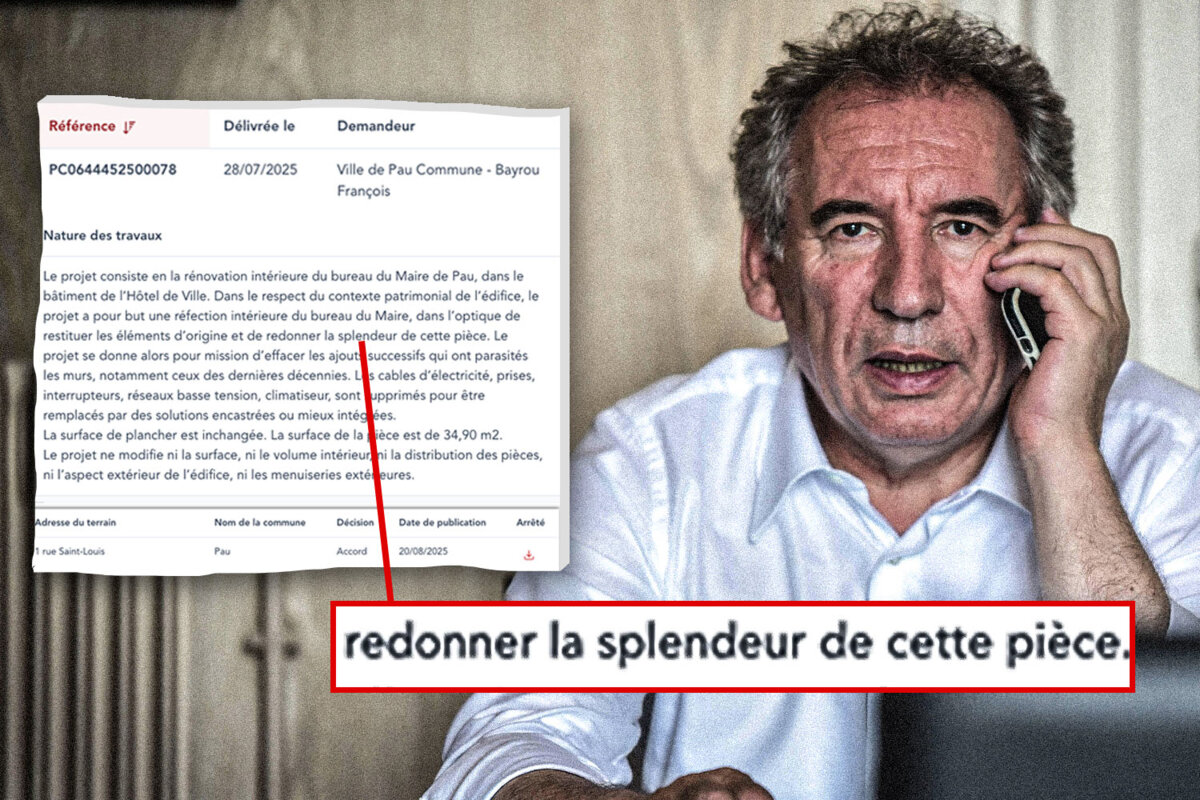Did the prime minister already suspect he might have to return to his old office at the city hall in Pau sooner than planned? For during the summer, as he warned of France’s rising debt and drew up an austerity budget for the country, François Bayrou, whose government could be toppled within days, also found time to order the renovation of his office in the small city where he remains the mayor.
There was no official press release on this renovation, and for good reason. According to Mediapart, the work ordered at this city hall in south-west France, which in the words of the official planning permission aims to “restore the original splendour” of François Bayrou’s mayoral office, will cost the tidy sum of 40,000 euros, all paid out of public funds.

Enlargement : Illustration 1

The work, which has yet to begin but which was approved by a council decree on July 28th, will involve lifting the present floor to recover the original parquet underneath, plastering the walls to bring back the “spirit of bygone days” of the room, removing cables, sockets, switches and an air conditioner, and, lastly, putting in new light fittings.
This expenditure, agreed in the quiet days of summer, is politically explosive. It comes in the midst of the austerity drive led by the prime minister, aimed above all at the state and local councils, which, in the words of François Bayrou on July 15th, must “set an example” by cutting their “spending habits”.
The prime minister has always been fond of his office in Pau, which he calls the “most beautiful in the Republic” thanks to its sweeping view of the Pyrénées. “I haven't touched a thing in this office,” François Bayrou told the daily regional newspaper Sud Ouest in 2021. “I redid the whole town hall except this office. The main reason was that I didn't want people to say I was looking after myself before looking after others. There's another reason: it's full of memories.”
Asked by Mediapart, Pau city hall’s press office said: “The city of Pau pays particular attention to the protection of its building, town and landscape heritage, a precious reflection of its history and cultural identity.”
“The city hall is one of the landmark buildings with major heritage value,” it went on, speaking of the changes to be carried out in François Bayrou’s office as “minor repair” work and which made up “0.88% of the total works carried out at the city hall between 2017 and 2024”.
Debt level has soared in Pau
The city hall is indeed keen on building work: its budget for renovating municipal buildings, first set at 11.2 million euros in 2023, has risen to 19.2 million euros, according to a council committee meeting on June 23rd.
More broadly, a reminder of his city’s budgetary plight is politically unhelpful for François Bayrou at this particular moment. His future as prime minister now hangs by a thread since he chose to call a vote of confidence in his government at the National Assembly on September 8th, a vote focussed solely on the issue of France’s debt and the need for thrift in public spending.
As Le Figaro newspaper reminded its readers in December 2024, “according to the Ministry of the Economy’s figures, Pau’s municipal debt rose from 60.2 million euros at the end of 2014 - the year François Bayrou became mayor - to 110.9 million euros in 2023, equal to a debt of 1,440 euros per city inhabitant”.
Pau town hall does not deny the jump in debt - which does not fund running costs, but investment - since François Bayrou took charge of the city. But it claims the debt is now falling; it was 108 million euros in 2024. “The debt per inhabitant is almost the same as the national average for cities of 50,000 to 100,000 people,” it says in a bid to reassure, adding that the city hall has the means to repay its future debts.
At the national level, meanwhile, François Bayrou never tires of warning about France’s debt. On July 8th, the prime minister spoke of a “critical”, “decisive” and “very demanding” time which elected officials were about to face. “We shall have less public money, whatever the governments to come. We can't pretend we don't see what's happening and what threatens us all: the state, local councils, charities, companies and families,” he said.
The very next day, his office filed an application for planning permission to bring back the “splendour” of his Pau office.
However, in an interview with Sud Ouest given after Mediapart's initial publication of this story in French, François Bayou attacked the row over his office in Pau as “insulting”.
The prime minister told the newspaper: “All this is completely mad. We redid all the offices at the city hall, all the meeting rooms, the wedding room, etc. The only office that wasn’t done, because I wanted the others to take priority, is the mayor’s. An office that’s more than thirty years old and falling apart.”
-------------------------------------------------------------------------------
- The original French version of this report can be found here.
English version by Michael Streeter


